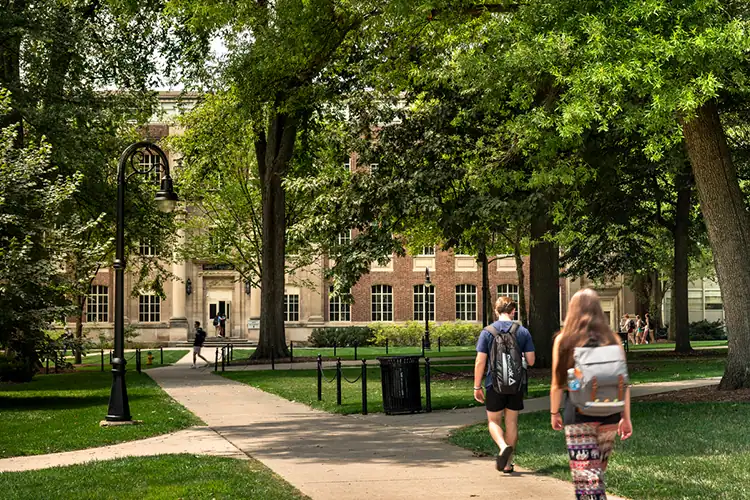10 Cheapest and Most Affordable Colleges in Hawaii
Updated: October 1, 2025

Key Takeaways
- Hawaii’s colleges offer a rare blend of affordability, cultural immersion, and academic quality.
- Specialized programs in areas like Pacific studies, marine science, and hospitality make Hawaii schools stand out.
- In-state tuition at public institutions often falls below $12,000 annually, and financial aid opportunities are extensive.
- Many colleges are located in island communities with small class sizes and strong local support networks.
- Whether you prefer a Christian university, a research-focused public school, or a career-driven program, Hawaii offers a wide range of affordable options.
- The University of the People provides an alternative online path with zero tuition and flexible global access.
Hawaii might be known for its stunning beaches and tropical climate, but it also offers some of the most unique and valuable educational opportunities in the country. Despite higher living costs, the state’s public colleges and universities maintain relatively competitive tuition rates. Many institutions also provide generous financial aid, including scholarships for Native Hawaiian students, federal partnerships, and campus-based support services. If you’re a Hawaii resident, you may be surprised by how affordable college can be.
Earning a degree in Hawaii means more than just attending classes. You get to study in one of the most culturally diverse states in the U.S., with programs deeply tied to the Pacific Rim and Hawaii’s local industries. Whether you’re interested in marine sciences, hospitality, Hawaiian studies, or sustainability, Hawaii’s colleges offer specialized programs you won’t find elsewhere. This list highlights the 10 most affordable colleges in Hawaii, based on in-state tuition, financial aid availability, and alignment with career outcomes. You’ll see that quality education here doesn’t have to come with a high price tag.

10 Most Affordable Colleges in Hawaii
Despite Hawaii’s high cost of living, the state offers a range of affordable colleges that provide meaningful academic and career opportunities. These ten institutions stand out for their low in-state tuition, student support, and program relevance to Hawaii’s workforce needs.
University of Hawaii, Maui College
Located in Kahului on the island of Maui, UH Maui College is a small, student-focused community college that serves Maui County and the surrounding islands. The school is known for integrating Hawaiian cultural values into the curriculum and for offering programs that support local industries.
Main Courses:
Culinary arts, hospitality and tourism, sustainable science management, liberal arts
Pros:
- Lowest tuition rate in the state
- Strong training in Maui’s key industries, like tourism and sustainability
- Access to community-based learning and internships
- Friendly campus with small class sizes and local faculty support
Cons:
- Limited availability of four-year degree programs
- Fewer student clubs and extracurriculars than in larger schools
- Island-specific location may limit off-campus job opportunities for some students
Average Annual In-State Tuition: $3,280
If you’re looking for practical, community-driven programs in a supportive environment, UH Maui offers great value for island residents and newcomers alike.
Brigham Young University–Hawaii
Set on the North Shore of Oahu in Laie, BYU–Hawaii is a private university affiliated with the Church of Jesus Christ of Latter-day Saints. It attracts students from over 70 countries, particularly from across the Pacific and Asia, creating a deeply multicultural campus.
Main Courses:
Business management, Pacific island studies, elementary and secondary education, liberal arts
Pros:
- Among the most affordable private universities in the U.S.
- Diverse international student body fosters global learning
- Campus emphasis on service, leadership, and moral values
- Programs are aligned with the Pacific and island community needs
Cons:
- Enrollment is limited to members of the LDS Church or those who agree to its honor code
- Campus lifestyle is highly structured with dress and conduct standards
- Less emphasis on scientific research or graduate-level studies
Average Annual In-State Tuition: $5,560
BYU–Hawaii is ideal for students who value a culturally rich, spiritually grounded education at a very affordable private school price.
University of Hawaii–West Oahu
UH West Oahu is a growing public university located in Kapolei, just outside Honolulu. It’s designed to meet the needs of Oahu’s working students, offering hybrid and online course options, and a campus that prioritizes accessibility.
Main Courses:
Business administration, public administration, social sciences, applied sciences
Pros:
- Affordable tuition and a modern, expanding campus
- Flexible programs designed for part-time and nontraditional students
- Strong ties to local government and industry for job placement
- Emphasis on applied learning with capstone projects and internships
Cons:
- Fewer majors and minors compared to larger universities
- Limited graduate program offerings
- More of a commuter campus with less emphasis on residential student life
Average Annual In-State Tuition: $7,500
If you’re a working student or looking for a career-oriented bachelor’s degree with maximum flexibility, UH West Oahu is a practical and cost-effective choice.
University of Hawaii at Hilo
Located on the Big Island, UH Hilo is a public university with a strong reputation in the natural sciences and Hawaiian cultural studies. The campus offers a peaceful, rural setting and is deeply connected to the local environment and indigenous heritage.
Main Courses:
Astronomy, Hawaiian studies, agriculture, marine science, liberal arts
Pros:
- Home to world-renowned astronomy programs and observatory access
- Strong focus on Hawaiian language, culture, and sustainability
- Small campus size allows for close faculty relationships
- Affordable tuition for a four-year public university
Cons:
- More limited course variety than larger campuses like Manoa
- Remote location can feel isolated for some students
- Fewer extracurricular options and nightlife compared to Oahu campuses
Average Annual In-State Tuition: $7,720
For students interested in astronomy, environmental science, or indigenous studies, UH Hilo offers a unique educational experience in one of Hawaii’s most culturally rich regions.
Pacific Rim Christian University
Based in Honolulu, Pacific Rim Christian University is a small, private Christian institution that prepares students for leadership and service roles with a strong focus on intercultural ministry and community engagement.
Main Courses:
Intercultural studies, biblical studies, business, and education
Pros:
- Specialized Christian education with a Pacific Rim perspective
- Close-knit student body and small class sizes
- Emphasis on leadership and service in multicultural communities
- Affordable tuition for a private institution
Cons:
- Very limited program selection outside of ministry and education
- Smaller campus and fewer amenities
- Not ideal for students seeking secular or STEM-focused degrees
Average Annual In-State Tuition: $10,460
This school is a great fit if you’re seeking faith-based education that focuses on intercultural understanding and service throughout the Pacific region.
University of Hawaii at Manoa
UH Manoa, located in Honolulu, is the flagship research university of the state. It offers Hawaii’s most comprehensive academic catalog and has earned international recognition for its programs in Pacific and Asian studies, marine science, and sustainability.
Main Courses:
Marine sciences, business, engineering, nursing, Pacific and Asian studies
Pros:
- Wide range of undergraduate and graduate programs
- Strong research infrastructure and global academic partnerships
- Beautiful campus near Waikiki and downtown Honolulu
- Highly respected faculty and alumni network
Cons:
- Higher tuition than other UH campuses
- Competitive admission for popular majors
- Parking and housing availability can be a challenge
Average Annual In-State Tuition: $11,980
If you’re looking for a full university experience with access to research, study abroad, and professional development, UH Manoa delivers excellent long-term value.
Argosy University – Hawaii
Located in Honolulu, Argosy University focuses on practical degrees designed for working adults, offering flexible class schedules and career-oriented programs. Although the university closed its campuses in 2019, some online programs under the Argosy brand may still be accessible through partner institutions or legacy systems.
Main Courses:
Psychology, business, education, and healthcare administration
Pros:
- Career-focused programs with flexible scheduling
- Geared toward adult learners and working professionals
- Strong emphasis on practical skills and professional development
Cons:
- Higher tuition compared to public universities
- Campus operations were discontinued, limiting accessibility
- Fewer student life opportunities or campus experiences
Average Annual In-State Tuition: $13,980
While not currently enrolling new on-campus students, Argosy previously offered tailored education for professionals seeking to advance in psychology, business, or healthcare.
University of Phoenix – Hawaii
A private, online-focused institution, University of Phoenix serves Hawaii-based students with flexible learning options. It’s particularly well-suited for working adults, military personnel, and professionals looking to complete a degree on their own time.
Main Courses:
Business, information technology, education, hand ealthcare administration
Pros:
- 100% online learning with flexible scheduling
- Military-friendly and transfer-credit supportive
- Designed for adult learners balancing work and school
Cons:
- Higher tuition than public institutions
- Limited campus engagement or traditional student life
- For-profit status may raise concerns for some
Average Annual In-State Tuition: $23,300
University of Phoenix provides Hawaii students with accessible, self-paced learning, especially if you’re balancing a job, military service, or family responsibilities.
Hawaii Pacific University (HPU)
Located in downtown Honolulu, HPU is a private university with a strong international presence and a professional, career-driven curriculum. The school offers flexible scheduling, diverse student populations, and respected programs in nursing, business, and marine sciences.
Main Courses:
Business, marine science, nursing, international studies
Pros:
- Urban campus with modern facilities
- Global student body and international exchange options
- Strong professional preparation and internship support
Cons:
- High tuition compared to public options
- Limited financial aid and scholarships
- More competitive entry for top-tier programs
Average Annual In-State Tuition: $25,980
HPU is ideal if you’re looking for a global educational experience in a professional environment, particularly in fields like business or healthcare.
Chaminade University of Honolulu
This private Catholic university in Honolulu emphasizes liberal arts education and values-based learning. With small class sizes and strong support services, Chaminade fosters personal growth alongside academic achievement.
Main Courses:
Business, education, criminal justice, liberal arts
Pros:
- Personalized attention and low student-faculty ratios
- Emphasis on community, service, and ethics
- Beautiful campus setting with strong academic advising
Cons:
- The highest tuition among the list
- Small campus and limited research infrastructure
- Fewer programs in STEM and technical fields
Average Annual In-State Tuition: $41,900
Despite its cost, Chaminade offers a values-focused, supportive academic environment ideal for students seeking strong faculty mentorship and liberal arts foundations.
Tuition and mandatory fee amounts change regularly and can vary by program, course load, credit amount, and delivery format. The figures listed here reflect the latest numbers available and are intended for comparison only. Always confirm the current annual in-state tuition and required fees on the university’s official website before applying.

Key Requirements for Enrolling in the Most Affordable Hawaii Colleges
You’ll need to meet specific application and eligibility requirements to make the most of Hawaii’s affordable college options. These steps determine your admission and play a major role in accessing in-state tuition and financial aid programs that can significantly reduce your costs.
Complete Application Form Submission
Each institution may use its own application or participate in the University of Hawaii system portal. You’ll need to fill out all required fields, including academic background, personal statements, and details about your cultural or community ties, especially relevant at schools that prioritize local or Native Hawaiian applicants.
Official High School Transcripts
You’ll need to provide official transcripts or GED documentation sent directly from your previous school. These records help determine your academic standing and may influence scholarship eligibility, especially for merit-based or specialized program aid.
Hawaii Residency Status Verification
Proving your residency is essential if you want to qualify for in-state tuition. Most colleges require at least 12 months of physical presence in Hawaii, along with documents such as a Hawaii driver’s license, state tax returns, or voter registration.
Standardized Test Score Submission
While some Hawaii colleges have adopted test-optional policies, many still require SAT or ACT scores for certain programs or scholarship consideration. Strong test scores can improve your chances of admission and may open the door to additional financial aid, particularly merit-based awards.
FAFSA Financial Aid Application
Completing the Free Application for Federal Student Aid (FAFSA) is essential. This form is your gateway to federal aid, state programs like the Hawaii B+ Scholarship, Native Hawaiian scholarships, and institutional support. Be sure to meet Hawaii’s priority deadlines to maximize your chances of receiving grants and aid packages.
How Do Hawaii College Costs Compare to National Averages
Hawaii’s college tuition rates are generally competitive with national figures. In-state students at public universities usually pay between $11,500 and $12,500 per year. While this is about 5% to 15% higher than the national average of $10,700, many students find that the educational value and unique learning environment more than justify the slight premium.
Beyond tuition, Hawaii offers several cost-saving benefits. State financial aid programs, scholarships for Native Hawaiian students, and lower transportation expenses due to the state’s compact geography can help reduce the total cost of attendance. Plus, year-round outdoor recreation and access to research or internship opportunities through local and federal partnerships offer an exceptional return on investment.
What Are the Tuition Fees for International Students at Affordable Hawaii Colleges
International students typically pay two to two-and-a-half times more than Hawaii residents. At public universities, this usually translates to tuition between $23,000 and $32,000 per year. Even with higher costs, many international students see Hawaii as a worthwhile choice thanks to its specialized programs in Pacific studies, marine sciences, and Asia-Pacific business.
In addition to tuition, international students should plan for mandatory health insurance ($2,800–$3,500 annually), visa processing fees, and higher living costs, especially on Oahu. Still, opportunities for part-time work in hospitality and tourism, plus strong cultural and academic offerings, make Hawaii an attractive destination for students from abroad.
How Does University of the People Compare with Most Affordable Colleges in Hawaii
If you’re looking for a more flexible and budget-friendly alternative to Hawaii’s most affordable colleges, the University of the People (UoPeople) is worth considering. UoPeople is a tuition-free, fully online institution accredited by the Distance Education Accrediting Commission (DEAC) and WASC. While students don’t pay tuition, assessment fees range from $160 per undergraduate course or $450 for MBA and MSIT courses. Even with these fees, the total cost of earning a degree can be significantly lower than attending traditional colleges in Hawaii, especially when you factor in living expenses, transportation, and fees associated with attending in-person classes across the islands.
That said, UoPeople offers a different kind of learning experience. Its fully online, asynchronous model is ideal for self-motivated learners who need flexibility, whether you’re balancing work, family, or living in a remote location. While you won’t get the campus environment, in-person research opportunities, or cultural immersion that Hawaii’s colleges provide, you will gain access to global learning communities and accredited degree programs in business, computer science, education, and health science. For students prioritizing cost and flexibility, UoPeople delivers quality, accredited education that’s globally accessible, making it a practical alternative to Hawaii’s traditional options.

Ready to Choose the Most Affordable College?
Choosing the right college in Hawaii comes down to more than just looking at tuition. You’ll want to compare the full cost of attendance, including housing, transportation, and fees, while also considering the financial aid available to you. Programs for Hawaii residents, Native Hawaiian students, and first-generation learners can significantly affect how much you pay. Also, look closely at graduation rates, job placement data, and whether a school offers programs that align with your personal and career goals.
If possible, visit campuses, talk to current students, and speak with a financial aid advisor. Think about what kind of environment works best for you, whether it’s a small private college, a large public university, or a fully online experience like the University of the People. Hawaii offers plenty of affordable options that don’t require sacrificing quality, and the right school can help you build a future rooted in both purpose and possibility.
FAQs
What is the average tuition at Hawaii’s most affordable colleges?
The average in-state tuition at Hawaii’s most affordable public colleges ranges from about $3,200 to $12,000 per year.
Which Hawaii college has the lowest in-state tuition rates?
University of Hawaii, Maui College offers the lowest in-state tuition, starting at approximately $3,280 annually.
What financial aid programs are available at Hawaii colleges?
Hawaii students may qualify for federal aid via the FAFSA, state grants, Native Hawaiian scholarships, and institutional aid.
Do Hawaii colleges offer work-study programs for students?
Yes, many public and private colleges in Hawaii offer federal work-study options and campus employment opportunities.
Which Hawaii college has the best job placement rates?
The University of Hawaii at Manoa is known for strong job placement, especially in research, marine science, and healthcare fields.
Do Hawaii colleges offer online degree programs?
Yes, several institutions, including University of Hawaii-West Oahu and University of Phoenix-Hawaii provide fully or partially online programs.
Affordable colleges in other states
- Alabama
- Alaska
- Arizona
- Arkansas
- California
- Colorado
- Connecticut
- Delaware
- Florida
- Georgia
- Hawaii
- Idaho
- Illinois
- Indiana
- Iowa
- Kansas
- Kentucky
- Louisiana
- Maine
- Maryland
- Massachusetts
- Michigan
- Minnesota
- Mississippi
- Missouri
- Montana
- Nebraska
- Nevada
- New Hampshire
- New Jersey
- New Mexico
- New York
- North Carolina
- North Dakota
- Ohio
- Oklahoma
- Oregon
- Pennsylvania
- Rhode Island
- South Carolina
- South Dakota
- Tennessee
- Texas of 2025
- Utah
- Vermont
- Virginia
- Washington
- West Virginia
- Wisconsin
- Wyoming


